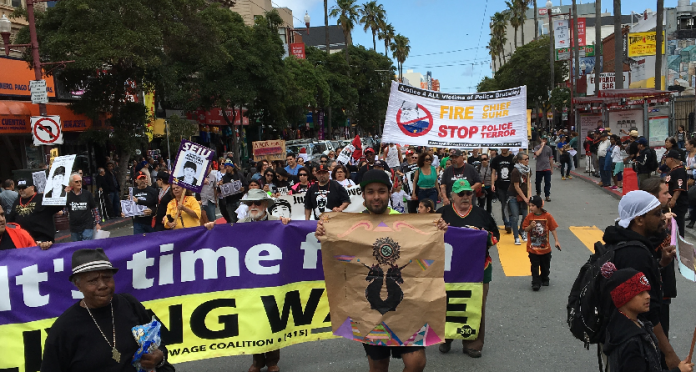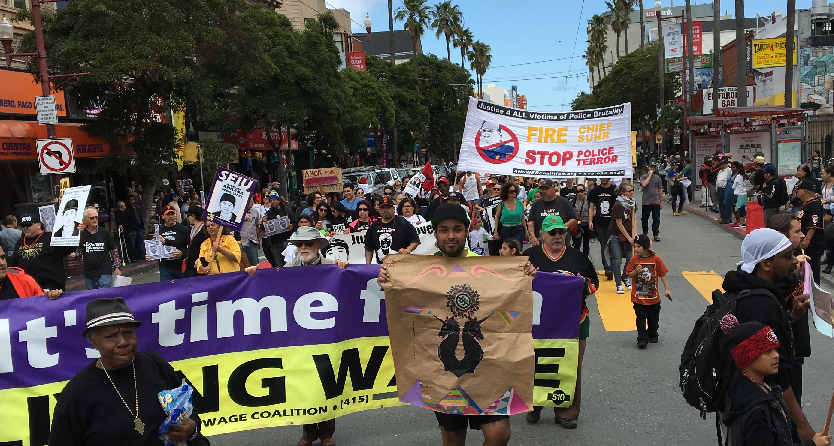
The role of the San Francisco Police Officers Association in blocking reform is increasingly becoming a focus among police-accountability activists — and the POA is under unprecedented scrutiny.
At a hearing last week before the Government Audit and Oversight Committee, called by Sup. Malia Cohen, a long line of speakers argued that the city shouldn’t approve a new contract with the POA until the union agrees to stop using a “meet-and-confer” demand to prevent the city from changing the rules around the changes that were outlined in a detailed federal report.

But that could make no difference at all: The contract is being negotiated by the Farrell Administration, and the mayor has been highly supportive of the POA – and the supes may be cut out of any meaningful role altogether.
The “No Justice, No Deal” coalition turned out in force at the Wednesday hearing. “I have never seen this much attention focused on the POA,” John Crew, a retired ACLU police practices lawyer who has been working on accountability issues for 35 years, told me.
Speakers focused on the old-school organization’s hostility to change and its constant attacks on anyone who tries to rein in the worst cowboy cops.
The POA, in response, argues that it’s “codswallop” that the organization opposes reform. In a March 20 letter, letter, POA lawyer Gregg McLean Adam says that the organization “has not filed a single challenge … to impede, delay, or otherwise stand in the way of the implementation of any DO recommendation.”
But that completely ignores reality – particularly Proposition H, which will be on the June ballot. Prop. H is a direct assault on the ability of the civilian Police Commission to regulate use-of-force issues. The initiative would not only require the city to arm cops with Tasers; it would overrule the rules the commission and Chief Scott have devised to make sure the stun guns aren’t abused.
It is, to abuse a metaphor, a stunning proposition: The cops want the voters to reject the idea that civilians can decide how and when police officers can use a potentially deadly weapon.
It’s about as clear opposition to the reforms most of the city has endorsed as you can imagine.
At the hearing, Crew noted that “the reform process is the top priority. It ought to be driving the MOU.” And if the POA wants to insist that it’s not interfering with that process, “then sign on the dotted line and agree not to resist reform in exchange for the massive pay increase” the cops are seeking.
Speakers at the hearing also raised the question of the role Mayor Mark Farrell is playing in the contract talks. Farrell brought Nate Ballard, a longtime City Hall insider who worked with the Newsom and Lee administrations, back as a short-term advisor.
His last job: Communications consultant for the POA.
The mayor has been, at best, shaky on Prop. H. At first, he said he wanted the Police Commission to adopt a policy that would allow Tasers; that’s happened. He said he fully supports the chief – who strongly opposes the measure.
Farrell later said the measure isn’t necessary – but declined to sign a ballot argument against it.
“What does the POA have to do, how far does it have to go over the line, to get the mayor to speak out?” Crew asked.
John Crew and I have been watching mayors and cops and the POA for more than 30 years. Neither of us can remember any mayor allowing this level of POA nonsense.
And it’s pretty clear that the POA welcomes Farrell’s role. In the February edition of the POA Journal, Vice President Tony Montoya, who is leading the bargaining team, noted that the city was resorting to proposals “North Korean Kim Jon Un might impose” and sending a message that “it does not value you or what you do.” Montoya warns that officers may leave rather than face “these draconian working conditions.”
Labor negotiations, Montoya notes, “are both a collaborative and an adversarial process. But the city seems to have lost track of the former and become inebriated in the latter.”
That was then. Now that Farrell is leading the talks, the POA is much more conciliatory. In his letter, Adam notes that “we would like to take this opportunity to recognize the efforts of the city’s negotiating team. … By and large, the city team has been professional and collaborative.”
Farrell’s office hasn’t responded to my questions.
But there’s another tricky element to all of this: The POA letter notes that the contract talks are headed for mediation March 26 – and then for arbitration April 16 if no contract is reached.
In theory, that could cut the supes out entirely,
Under Section 8.590 of the City Charter, public-safety personnel are barred from striking; in exchange, if there’s an impasse in negotiations, the final contract is decided by a three-person panel of arbitrators – and that decision is final and biding on all parties. In essence, the arbitrators go over every disputed element and settle it among themselves.
At this point, there’s no indication that Farrell or the Department of Human Relations, which handles the negotiations, has even asked the POA for an agreement not to block or delay reforms. If that’s not even on the table, and the two sides (perhaps by mutual consent) wind up in arbitration, I don’t think there’s any way the supervisors can force the issue.
Far be it from the likes of me to suggest that Nate Ballard is so fiendishly clever and manipulative that he would get Farrell and the POA to jointly force an impasse, putting this into arbitration, and avoiding any possibility that the supervisors – who overwhelmingly want accountability and might not approve any MOU that still allows the cops to block reform – have a final say in the matter.
But if that’s what happens, you read it here first.



Sorry, @sanchezresident:disqus , he made definitive statements to the press that the fire fighting was an “abject failure”. He could not possibly have had a factual basis for that statement. Nobody could from across the street.
So why should we believe anything he says now that we know that he makes baseless, though emphatic, statements?
And professional politicians who do something THAT stupid will be forced to apologize.
What does it say about his character that he criticized firefighters for not pouring water on their comrades who are in a burning building? It takes a special type of person to do something like that.
Didn’t Supervisor Peskin apologize for his comments? That also speaks to his character. What other professional politician makes an apology?
Breed has not been strong on police accountability in the past, so there is little reason to believe that she would have behaved much differently in this situation.
Peskin is a brilliant man.
He can stand across the street from a burning building and be able to factually state that the firefighter’s efforts inside it are “an abject failure”. That takes remarkable insight.
Thank Peskin for Farrell, and his back room dealings.
The “Supes” (the ones who seem to care) brought this on themselves. Couldn’t restrain themselves.
Don’t think they’d get anything like this from Breed, but I could be wrong.
“officers may leave rather than face “these draconian working conditions.”” – probably only the veterans who have already retired and come back to double-dip.
Hope this all was worth neutralizing whatever silly advantage London Breed supposedly had from being Acting Mayor.